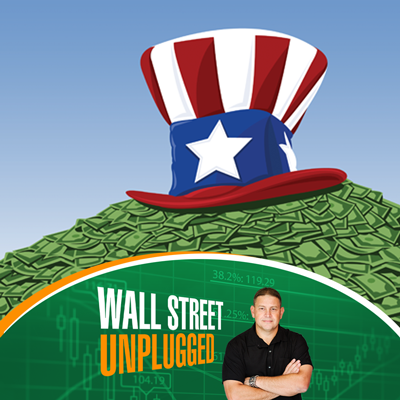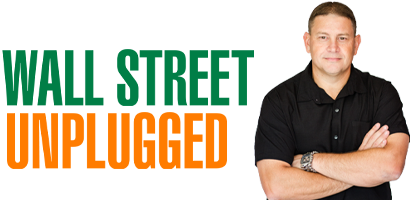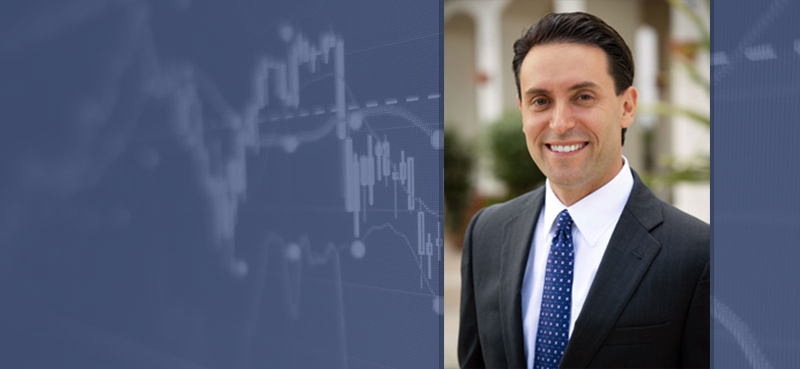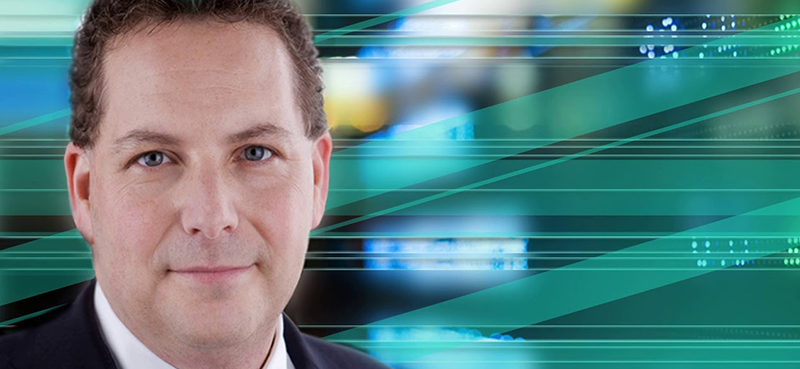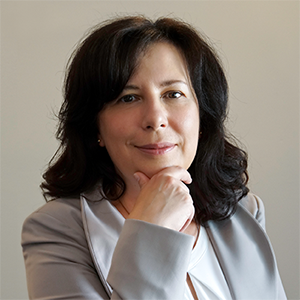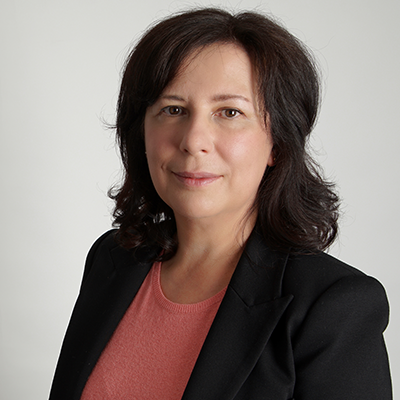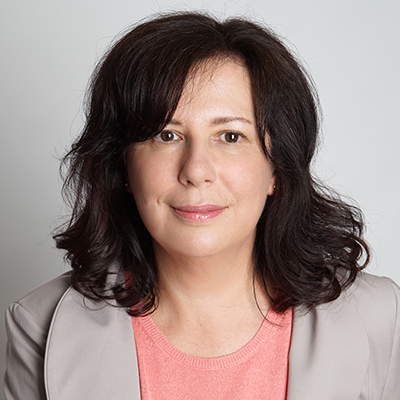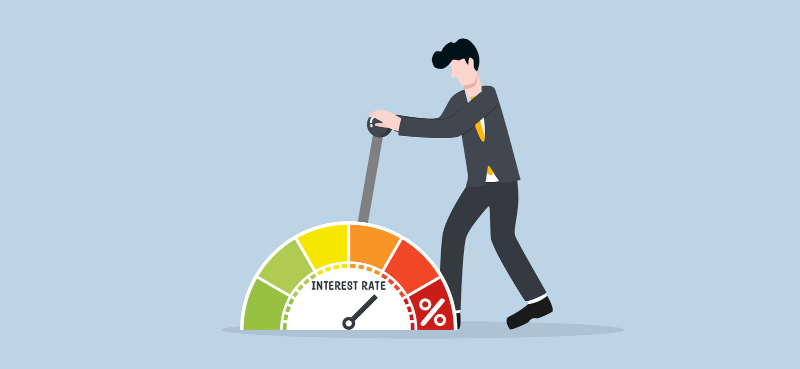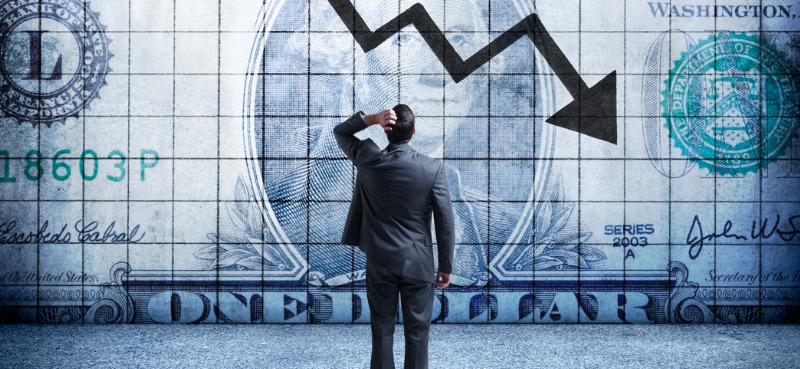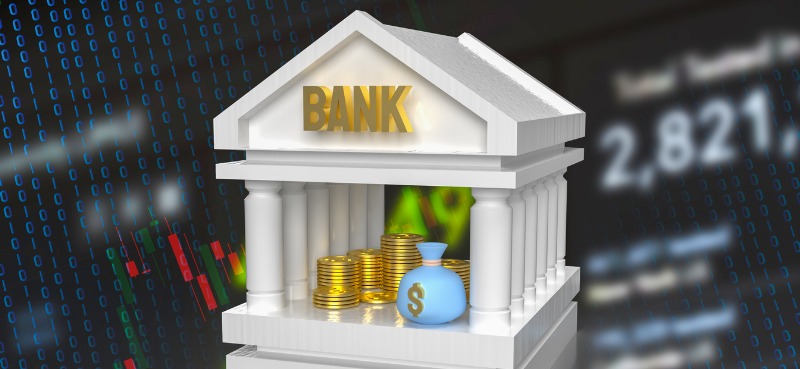Last week, the Fed announced the results of its annual stress test… and all the major U.S. banks passed. Now, banks are raising dividends and buybacks—all good news for the economy.
But a few days later, Neel Kashkari, president of the Federal Reserve Bank of Minneapolis, shared an op-ed slamming bank bailouts. Here’s why he’s full of s***. [00:35]
Then, Genia Turanova, editor of Curzio’s MoneyFlow Trader and Unlimited Income, shares her thoughts on whether inflation will be transitory… and the risks it creates over the long term.
With all the uncertainty in today’s markets, Genia lays out the importance of hedging your portfolio… and how her MoneyFlow Trader strategy can limit your losses.
Genia also offers a valuable lesson on why you should be skeptical of high-dividend-paying companies… and what income investors should look for instead. [25:39]
Plus, how retail investors are driving “meme” stocks higher… And who will benefit the most from rising capital expenditures. [57:26]
Wall Street Unplugged | 780
Neel Kashkari is full of s***
Announcer: Wall Street Unplugged looks beyond the regular headlines heard on mainstream financial media to bring you unscripted interviews and breaking commentary direct from Wall Street right to you on Main Street.
Frank Curzio: How’s it going out there? It’s June 30. I’m Frank Curzio, host of the Wall Street Unplugged Podcast, where I break the headlines and tell you what’s really moving these markets. A crazy few weeks, earnings season. We’re in the middle of it here. Not a lot of news out. Note there’s does a 24-hour cycle of news and financial news, right? It’s 24 hours, they have to report something. That’s how stories get amplified when they’re not really a big deal, but there was one thing I wanted to talk about that was very, very important that happened. It was just a few days ago, and it was the banks.
Frank Curzio: So, the banks came out with the stress test results, annually you do your stress test, making sure they’re secure, they’re fine. They were standing so many different things, we’ll cover that in a second. And in short, as expected, all the banks passed the stress test. Now these banks, they have around 175 billion combined in excess capital. That’s how easily they pass. Now put that in perspective. It equates to about 10% of the average market cap. So, in other words, let’s take JPMorgan, right? Largest bank in the world. Its market cap is 460 billion. That’s 46 billion in excess capital that has now. And what are they going to do? They’re going to buy back a lot of their stock, increase their dividend. They just made a recent acquisition. They paid a few fines, I think.
Frank Curzio: They announced, “So, I do have a platform that wasn’t regulated. We don’t admit it to doing anything wrong, but here’s a couple million dollars to the SEC,” and a lot of that worked out, which is all cool. But when I put the entire thing in perspective, and this is the story that’s not being told here, because I saw an interesting quote from, this is the Federal Reserve president, he’s from Minnesota, Neel Kashkari. So, Kashkari has a nice history. He was the former intern head of the Treasury Department’s Office of Financial Stability, right? So, he oversaw the Troubled Asset Relief Program, that was during the credit crisis, which bailed out every major bank, right? He oversaw it. He knew exactly what’s going on?
Frank Curzio: And after these stress test results, he comes out and says, “It’s right if they’re released, that the losses that banking sector was much smaller than expected because governments were aggressive in providing fiscal support to families and businesses affected by the COVID crisis,” which I agree, right? You gave everybody money, so it wasn’t a big deal what happened to anything. It was just, “Hey, let’s give money.” 10.5 trillion. More is coming, and I say to the government, I include the Fed, because the Fed is the government, right? It’s the same thing now. We know that for the past how many administrations. Donald Trump controlled the Fed. We see Biden… They control the Fed, right? The Fed operates based on who’s in office, right? So, it’s supposed to be separate. It’s never separate.
Frank Curzio: But now, we’ll look at 10.5 trillion dollars in check. So, I agree with him. I definitely agree with him. Then he said, “They should have even higher requirements, these banks, than already in place because banks cannot expect the government to bail them out of every crisis.” This is Kashkari. This is what he said, “Wait a minute, higher requirements right now, the annual stress test for banks?” And these are put in place after the credit crisis, called for the banks to have enough capital to withstand a 10% plus employment rate, a 35% drop in commercial real estate prices, and a 55% drop in the stock market. This is put in place, just percentages that they throw out there. I don’t know how they calculated them, but to put those three events in perspective, together, they’ve only happened once in our entire history.
Frank Curzio: And it wasn’t during COVID. Commercial real estate held up well. Stock market did not fall below these levels, 55%. It didn’t happen during the credit crisis. Stocks were around 35%. You have to go back to the Great Depression between 1929-1931, which means that these events are never ever going to happen together, and even during COVID, if they do, I believe, the government is just going to throw trillions at the market anyway. So, why do you have these requirements in place for the banks when you’re going to bail them out anyway? You say, “No, we’re not going to bail them out in the future.” Kashkari, here’s a newsflash for you. You’re the asshole that bailed them out, being in charge of TARP in 2008. You know the whole system. Come on.
Frank Curzio: And where are we today? Because of these new rules put in place for banks, which you had a hand in, well, let’s revisit that. In 2007, pre-credit crisis, JPMorgan had a market cap of 140 billion which fell to around 70 billion before it bounced back up in 2009. Every bank got nailed, so much was JPMorgan. Back then, I won’t even give you the 140 billion in 2007, you guys, Fed government deemed them too big to fail at $140 billion market cap. Now, we look at today, because of your requirements you put in place, which by the way, you want to increase, you want to increase, right? JPMorgan has a market cap of $460 billion, almost three times as large. And you’re saying banks can’t expect the government to bail him out of every crisis? You have to.
Frank Curzio: If you couldn’t let these banks fail whenever, 10 plus years ago during a credit crisis, when the market caps are 25% of what they are today, how the hell can you let them fail in the future? You can’t do it. So, you know what? Stop grandstanding, stop the bullshit. We see it from a mile away, “Oh, they need higher requirements.” If you look at the banking industry, it’s one of the only ones… And believe me, I’m getting to a bigger point here because I’m going to make you guys a lot, a lot of money. It’s going to be very, very simple to make money, okay? I’m going to explain to you.
Frank Curzio: Because if you look at banking, it’s one of the only industries where the main players will remain dominators forever. They have no competitive threats. In other words, you’re not going to see a mid-cap bank suddenly grown to a mega-cap. It’s not going to happen. You can’t have a Citizens Financial. These are large regional banks expand to the point where they have a greater market cap than of JPMorgan’s, Bank of America’s, Wells Fargo’s. The current laws don’t allow it. It doesn’t allow it that are in place. Hey, Facebook, a trillion dollar company, came out of nowhere. Google at one point. You create the right company. A lot of times these guys get bought out early on because there’s so much cash in the balance sheets of technology companies, but you have a shot to become an industry leader and disruptor.
Frank Curzio: You’re not disrupting banking. It’s got to come from the top. Because even if you do, you’ll get bought out, but there’s laws in place that they’re not going to have competition which is insane, but if you look at it, the stress tests. So, the stress test, when I say the current laws don’t allow it, here’s the biggest requirements. The biggest requirements, which are for any bank that holds more than $250 billion in assets, right? This amounts to 23 banks. So, this is the biggest requirement that they have on the books. The biggest requirement is called Common Equity Tier 1 capital, CET1 for short, okay? I’m going to make this very simple. I don’t want to get too complicated, but it’s very important you understand this. It’s the core capital, which is common stock retained earnings preferred stock, a bank holds in its capital structure.
Frank Curzio: And the CET1 ratio, it’s a very big deal of stress tests in banks, I know if you don’t know bank industry, you’re like, “What the hell is this?” I’m explaining to you. The CET1 ratio compares the bank’s core capital against its risk-weighted assets which simply means this determines the bank’s ability to withstand a financial distress or crisis, which they put in place, which is the 55% mark collapse, 35% drop in home prices, commercial real estate and they put those measures, whatever measures are put in place by regulator, right? So, again, I don’t want to get too complicated and lose you here, but regulators require that a Tier 1 capital ratio should be at least 4.5%. So, just know 4.5% is a big deal. So, lower and you fail.
Frank Curzio: Now, I don’t know if anyone took a look at this stuff. A few people did, a few analysts did. But I’m going to put something in perspective, so you understand how powerful these banks are. So, if you’re looking at the minimum CET ratio 4.5%, across the board for all these 23 banks, you’re looking at an average. They’re above the average by over double, so by 10%. So, you’re looking at 4.5% minimum for bank America, it’s 11.8%. To Citibank, it’s also 11.8%. For Morgan Stanley, it’s 16.7%. What does that mean that directly leads to capital? So, the 11% for Bank of America, again trying to make this simple, the number you really need to know is it amounts to $25 billion in excess capital based on their market cap.
Frank Curzio: So, if you take JPMorgan, it’s 13 billion. Now, JPMorgan is a bigger company, so it’s not a big deal, but here’s where it gets crazy. When you’re looking at these numbers, JPMorgan, Bank of America, Morgan Stanley, Citigroup, they have massive market caps, but if you’re looking even at a Wells Fargo, so their capital ratio, that CET1, again minimum 4.5% below that is bad, came in at nearly 12%. That amounts to $32 billion in excess capital which is 18% of their market cap. 18% of their market cap, which they could use for what? To increase dividends, buy back their stock and acquire companies.
Frank Curzio: Now, three stocks from this and they all passed very, very easily, again the average passed by 10%, but these there’s stocks, Wells Fargo, PNC… So PNC amounts to 17% of their market cap, so they have $13 billion in capital. That’s a 17% of the market cap. But the big name here is Capital One. So, Capital One is 22 billion excess capital if you compare that to their market cap. That amounts to 32% of their market cap. Think about that for a minute. Now, you have $100 billion, you have a little over 30 billion that you can only use really, you can’t really use it too much, right? You can acquire some companies, but now, they’ve got the green light to buy back a ton of their stock and to increase their dividends in a zero interest rate environment where the banks already paid pretty good dividends.
Frank Curzio: So, when you’re really looking at the numbers that these guys reported, the stress tests are meaningless. No one’s ever going to fail it again. We just went through COVID, and they’re immune for COVID because the government said, “Here, here’s 10.5 trillion. We’re going to bail out the world,” and they’re going to do that every single time we have a crisis going forward, every single time. Why? Because they haven’t seen the consequences of being wrong. The credit crisis they are right, “Hey, what were the consequences?” “Nothing. What? Higher debt? Who cares. Does that stop stocks, equities, household wealth from going to record highs? No. Same thing with COVID. Let’s just throw money at it.”
Frank Curzio: That’s why I’m so concerned with inflation because inflation is something that the Fed can’t control by throwing money at it. They actually have to do the opposite to take money out of it which is going to be extremely, extremely painful and result in a lot of stocks, especially high P/E names getting wrecked. I’m still on the fence. I warned. I don’t think this is transitory. I hope it is, but if it’s not, we’re going to have the Fed raising rates, stop buying bonds, stop throwing money into the system. It’s going to get a little crazy out there, guys. You’re going to see a market that you’re not used to over the past, what? 12 years. Is this a credit crisis?
Frank Curzio: But more important, anyone telling you that another credit crisis, and let’s say we can’t see a 10-20% market pullback, we can easily see that, depending on what happens with the economy and jobs and whatever, but I’m talking about credit crisis. So, anyone telling you another credit crisis, which we heard from how many bears over the past 10 years, “It’s coming. It’s coming. Look at debt levels of credit.” Again, you don’t have to worry about debt at all. The only thing you have to worry about is if it’s being paid and paid on time. And it is. It is. And the bankers report that in the stress test. Loan loss is going down. Things are better.
Frank Curzio: But anyone telling you another credit crisis is coming, it’s either trying to sell you something or is just an idiot that doesn’t know how to read balance sheets. Again, if you look at the banks, loan loss is down incredibly, across the board for the banks, excess capital at record highs. That interest margins have gone higher, have gone. I’m not talking about margins for technology companies. These guys, their net interest margin has a lot to do with interest rates. So, interest rates go higher, these guys usually make more money. Banks make more money. It’s good for banks in terms of profits when interest rates go higher. They increase that spread in that interest margin. They found a way to increase margins in the lowest interest rate environment in history.
Frank Curzio: Just a guess here, it might be generating a lot of money by giving you zero interest on your checking accounts, were charging you 20% interest on your credit cards, that’s probably a pretty good thing for them. Well, you know the amount of fees? You have to pay to send a wire or transfer money, fees on their investment funds. These guys make fees… You have their money there and you’re paying fees, fees, fees, fees, fees to everything. If you’re filthy rich, yeah, they give you all the breaks. If not, they wreck you. The banks, they’ve never been stronger in history of our nation. The environment has never been better. How many institutions and businesses are borrowing money like crazy? Consumers have more money than they ever had, and they’re paying this off.
Frank Curzio: They’re lending money like crazy. Go nuts. Household wealth at a record high. Massive buybacks coming. Much higher dividends coming, an inflation which we all see coming is going to result in higher rates, which is going to increase their net interest margins, which they’re already doing well on. The kicker here, banks, holy cow, do you see where they’re trading at? JP was trading 11 times forward earnings. Wells’ 12 times forward earnings. Citi at eight times. Goldman Sachs eight times. You could say, “Well, that’s where the sector trades. Yeah, yeah, that’s fine, but banks, especially investment banks, holy cow, they’re growing earnings much faster than the overall market, and again, they’re going to increase buybacks, increase dividends which are already large. People die for income.
Frank Curzio: From a risk-adjusted basis, banks by far, by far, by far, not even close is the best sector you can own nobody’s even close on a risk adjusted basis because they’re buying back stock, and you have to see massive growth in their earnings to see earnings go higher because you don’t have to dig deep. Buying back the stock, take more shares off the market. Now, I know something, I know that you hate banks and I get it. What they did to cause a credit crisis? Take on excess leverage without anyone knowing behind the scenes even the regulators didn’t know, so they inflated profits. Why? To pay themselves huge bonuses. They all made out like bandits. It was great until it wasn’t great anymore.
Frank Curzio: And everyone was on the take, everyone, the insurance companies, credit rating agencies’ new deal and market originators who basically sold any loan you needed. “How much money you got in the bank? Is it positive you have 50 bucks? Okay, you’re good. What kind of ID do you have? Do you have a library card? Okay, here’s a $600,000 loan.” Why they do that? Because they made the fees off of that and then gave the loan to Freddie and Fannie and unloaded the risk, a government organization that doesn’t really fricking pay attention, just like the Post Office, right? Same things when the Post Office loses billions and billions and billions of dollars every year. Yet, UPS and FedEx net profit skyrocket because they don’t care. They don’t care.
Frank Curzio: It’s not run like a business. It’s run as, “Hey, let’s just try to do the right thing and hire certain people and whatever.” That’s our government. That’s why the government sucks at running businesses, because there’s no checks and balances ever. “You could lose much money you want and don’t worry about it. We’ll give you more. It’s fine. We got it. We’ll get it someplace.” Look at the infrastructure bill. The infrastructure bill is coming out. What is it? 9% of the bill is infrastructure. Are you kidding me? We all know, we all see it. But getting back to hating the banks, these guys almost crash the entire global financial system, the entire financial system.
Frank Curzio: And what was their punishment? What was their punishment after generating hundreds of billions in revenue and these guys generate millions of dollars for themselves and those bonuses? A few billion dollars in fines. No jail time for anyone. No way. And the Fed, what did they do? They put laws in place to make these banks even stronger than they were pre-credit crisis. That’s why it’s a joke, Kashkari says, “Oh, well, we’re not always going to be there. You can’t expect us to be there.” You have to be there. You don’t have a choice. If you went to a bank that failed, given that it’s too big to fail at $140 billion valuation, don’t you think at a $460 billion valuation is definitely too big to fail? You don’t think these are too big to fail. They’re always going to be too big to fail because it’s a limited sector, it’s 23 banks. You have the large banks. No one can be… It’s not going to spread out. You’re not going to diversify the risks. They’re all intertwined somehow or another. You’re always going to bail them out. Just say it. Just say it. Have the balls to say it.
Frank Curzio: So yes, I understand most people hate banks. I think they’re assholes as well. But don’t ever let your emotions get in the way of your ultimate goal. And what is your ultimate goal as an investor: It’s to increase your household wealth, to retire early, to make sure your kids are taken care of. That’s everyone’s goal. I don’t care if you’re a Democrat or Republican. All investors, that’s what they want to do. We want to build our wealth over time and make sure our families are financially secure and their families are financial secure. That’s everyone’s goal. That’s what we all want to do. That’s a one universe that we could all agree on.
Frank Curzio: Talk about investors here, not gamblers which 99% of those people will lose their money and you look at people who bought AMC or GameStop, great. They’re sitting on massive gains. We turn their portfolio into a couple million dollars or whatever, but when you do that, you’re gambling. Think about gamblers, right? The more you win, the more the gamble. They want proof? The NFL. They have the early games and the late games. If you have two games that you like and they’re both in early games and you win them, you definitely bet in the late games, even though you didn’t like any of the late games because you just won. That’s what gamblers do.
Frank Curzio: I’m not talking about that crap. I’m talking about investors, long-term goals, increasing your household wealth, thinking about your kids, your family, getting married, whatever. So, when it comes to banks, you need to have at least one big bank in your portfolio. I recommended Goldman Sachs a year ago when everyone, everyone hated banks. That’s when you want to buy. Now, everyone’s not going to like it. It doesn’t matter. Based on each stress test and the amount of capital they have on the balance sheet that they’re going to use to buy back stock, increase their dividends and a market where it’s impossible to get high yield sometimes in most places. We’re up 77% on that position, Goldman Sachs. I think it’s gotten a lot higher.
Frank Curzio: Right now, the three I mentioned Wells Fargo, PNC, especially Capital One, these guys have tons of capital 17, 18, 32% of its market cap in capital that they’re going to use to buy back stock, acquire companies and raise their dividends. And it’s all coming. If you look at all strong buys, although I think you could probably pick any single bank, any one of those, these 23 out of a hat, and it’ll easily outperform the market over the next three to five years, even a 10-year period, just the tailwinds are too great. If you have inflation coming, higher rates coming, it could take a year or two, whatever, the Fed said, which is amazing a couple weeks ago, everyone said, “They’re tapering… 18 months from now, we may look to raise rates and we’re not going to stop buying bonds.”
Frank Curzio: No, it’s pure easy, but they’re going to get there. But it’s 18 months, two years, two and a half years, you’re going to see rates go high. As they do, that increases their net interest margins. Massive buybacks coming, guaranteed. Increasing their dividends, guaranteed. And the biggest kicker of all is what we just saw during COVID is the Fed and the government, which are the same thing, they’ll always be there during a crisis. They’ll always be there to bail out the economy which is basically bailing out the banks, injecting 10.5 trillion to the market during COVID. The banks didn’t miss a beat.
Frank Curzio: So, own the banks. At least one of them should be in your portfolio. Again, from a risk-adjusted basis, you’re not going to find a better sector, you will not find a better sector to buy because these returns are going to be much, much greater, and you’re not going to have to take on a lot of risk because everything’s there. High interest rates benefits these guys. If we have a crisis, it benefits these guys because the government is going to bail them out. They have to. They’re too big to fail. So, what’s the risk here? You’re looking for income. Here you go. Different companies are going to buy back their stock which will not artificially inflate earnings, but it’s going to push earnings even higher, probably higher than the industry or the S&P 500, which is trading at 21 times forward earnings. These guys are trading at what? 10, 11, 12 earnings, Single digits for Citigroup.
Frank Curzio: Holy cow, but this is a story I feel like nobody’s telling… They passed the stress test and everything is good. I just want to give you the details behind it because I love looking under the hood, explaining things because then you can say, “Holy cow, this makes so much sense.” I know it’s difficult. It can be. Even if I recommend a tobacco stock, my dad died of lung cancer, I put that aside. My job. The reason why people pay for my newsletters is to make them money. If I see an opportunity that’s going to make you money, whatever sector it’s in, I’m going to recommend it. If it’s really that personal to you, don’t buy it. I get it. I understand.
Frank Curzio: But when it comes to the banks, you can still hate them. You can still hold up a sign if you want in front of Bank of Americas all over the country, wherever you want to do and just create Facebook groups and rallies against them, whatever, just own them. Make sure you own them. Just like Facebook. They collect all your data. We all know it. We all hate it. It’s going higher. They have access to over 2 billion people of everything they’re doing every single second and now they have AI, all of it. They know exactly what you’re going to do in 10 minutes from now, tomorrow, next week and six months from now which advertisers pay an absolute fortune for. That’s what companies want because of their ad budgets.
Frank Curzio: The banks definitely own them because they have lots of tailwinds. They’ll always get bailed out. Definitely put one of these in your portfolio. Speaking of the whole economic environment, especially inflation, today’s guest is Genia Turanova. She’s the editor of Moneyflow Trader and Unlimited Income, I recently watched that, that’s a Curzio Research. I’m not sure if you know this, even if subscribers know this, but Genia is a former economics professor. And we’re going to really dig deep on that biggest risk at everyone’s portfolio, like I said, and that’s inflation because it’s something the fed can’t bail out, right? You’re not going to be able to throw money at it. That’s the biggest risk. So, she really digs in deeper, deeper than even I do. She’s much smarter than me when it comes to the economy.
Frank Curzio: It’s going to be a great conversation. It’s not going to be boring, I promise. Then she’s going to talk about option strategies, which holy cow, option contracts exploding, right? So, many people get in to options, but she explains how everyone can use them to hedge your portfolio, which by the way is super easy to do. I feel like a lot of retail investors still don’t do this, and it can be done in any online brokerage accounts, simple as buying a stock. She’s going to break that down. I’m also going to discuss the winning formula for generating income and it’s not compounding, it’s not buying equities with high yields, it’s not reinvesting dividends, believe it or not. It’s a formula that few people use. A formula that Genia uses to perfection thus far in our Unlimited Income newsletter that has helped subscribers immensely, to the tune of 18 positions are in her portfolio right now. Every single one of them, other than one which just made like three weeks is down 0.8%, the whole portfolio is up. The whole portfolio is up.
Frank Curzio: We know from the market, yes, we see stocks all-time highs, a lot of stocks are still trading 20, 30, 40% off their highs. She’s doing a fantastic job because she files a formula that few people talk about. Because everyone looks at income, they look at that interest rate, she’s going to break it down. Most important, she’s going to share her favorite income name with you, which most people will never invest in his name for income and that’s why it’s important to listen to this. There’s a reason why Unlimited Income is one of our fastest growing newsletters and people are… It’s great. I just feel like people say, “Income and it’s boring, it’s terrible.” This is how you invest in income where it is exciting. And it’s a form of that. I’d say 95% of people in newsletters I see out there don’t pay attention to, definitely, definitely pay attention to this. You’re going to get her favorite idea and you’re going to learn a lot from this interview. And let’s get to it right now.
Frank Curzio: Genia Turanova, thanks so much for joining us on Wall Street Unplugged.
Genia Turanova: My pleasure. Hello.
Frank Curzio: So, you write our Moneyflow Trader newsletter and you also write one of our recent launch newsletters, Unlimited Income, which we’re going to get to in a minute, but I think a lot of people don’t know this about you is that you used to be an economics professor and I know through your newsletter, you explained which is a top down approach and you look at the economy. I want to start there because that’s why I get the most questions from when it comes to subscribers in terms of inflation. They see they’re out in the real world, the labor shortages and what’s going on out there and prices being raised across the board.
Frank Curzio: What are your thoughts right now where we have stocks at all-time highs, earnings are up tremendously and expect to be up tremendously year over year, which not only year over year, but that of record numbers, meaning that they’re higher than pre-COVID? We see 9.3 million people unemployed, but 9.3 million jobs are out there, right? So, they are available. You’re looking at home prices at record highs, again, stocks are at record highs, all asset prices near record highs. Yet, the Fed is still pedal to the metal, saying, “This is going to be transitory and there’s nothing at all to worry about.” What are your thoughts? And how are you playing this in your newsletters? Because for me, it seems like inflation is guaranteed. It’s here right now. We all see every economic indicator, but according to the Fed, it’s transitory and everything’s going to be just perfectly fine.
Genia Turanova: Everything might be just perfectly fine, but chances are that the inflation is here to stay. It might be a little lower than the current 5%, on the Fed’s preferred, the 4% on the Fed’s preferred measure. Maybe a little bit higher on them. They could just go and say, “You know what? Wait a little longer while average shut down a little bit and then the years of deflation, so we’ll have to go out a few years more.” And the problem with inflation is that it throws everything out of whack. Some sectors start to grow faster, the costs accelerate. Then the profit begins to fall, and then some sectors begin to play catch up, and the materials, honestly often go totally crazy. And that by itself can start a new cycle and a new crisis.
Genia Turanova: Inflation is not something to mess with, and in this situation, as we have today, for all this money, they just simply chase a limited amount of goods. There’s nowhere for this money to go. And I think it’s as simple as that. You can’t put this money in the bank. Well, you can, but why? The interest is zero and minus inflation will be negative. So, you let it do something in the real world with the market or the economy. So, it is a little bit stimulatory, but this stimulus will play itself out to the way that inflation will continue to be a big factor. So, I think it needs to be seen as a real phenomenon and not likely turns into a transitionary phenomenon that will stop in 2022.
Genia Turanova: There’s no magical economic event that will begin in 2022 after which inflation will suddenly stop. It’s just not going to happen unless we begin slowing down the money printing and possibly raise rates which again not likely to happen.
Frank Curzio: It’s funny because a couple weeks ago, the fed came out with their meeting and a few days after that, the market really came down saying that they’re going to taper. I didn’t see anything of that nature at all. I have no idea what everyone’s talking about. Maybe that’s why the markets bounced back to new highs, but what I heard is we’re not touching interest rates for 18 months which is a really, really, really long time. We’re not going to stop buying bonds anytime soon and you’re going to be fine. It’s going be transitory, which the Fed said, “When I tell you how long transitory is.” That definition is brief, which I would think three, four, five months. It could extend into next year.
Frank Curzio: So, we talked just before this and discussed this and I’m going to ask you the question that you asked me because it’s important. When we look at 2008, even 2007, the Fed was raising interest rates and they were wrong. They didn’t know what was going on, but they said, “Okay,” and reversed it which is fine. Why wouldn’t they do that today and say, “Okay, we’re gradually going to raise rates, and if it’s transitory, well, we could take whatever. We could take them back, whatever it is”? But they’re seeing things that aren’t there to the point where… They’re saying that we still haven’t seen this come out of the woods from COVID which we have on every single level, asset prices. You’re looking at jobs. You’re looking at everything, right?
Frank Curzio: The actual unemployment rate isn’t as low and they’re focusing on, but it really is, if we stop giving free money to people. They’re still printing like crazy. Everything is more better, profits, margins better than they’ve ever been. So, I always get the question actually like, what is the Fed afraid of here because everything is pointing for them to gradually just start taking away the punchbowl and just makes sense where we are right now? But we’re not seeing that at all, and it’s leading to massive speculation, very easy to raise money these days, ESG companies with no profits going through the roofs, the AMCs and everything. You’re just seeing so much risk taking and craziness out there, but what is that the Fed are afraid of?
Frank Curzio: You ask me that, I don’t know. I said, politically, it seems like more organization has political control than ever that happened in the Trump administration, even now. This must be separate. But why wouldn’t the Fed use a strategy like that? And I guess we can go into the consequences if we do see a lot more inflation.
Genia Turanova: I don’t know if they’re exactly political or if there’s anything they know that we’re at now, but it looks like they just are afraid of the tantrum. They don’t want a stronger dollar. We want to be on the same page as the rest of the developed world which is also in the extreme easing in the states over extreme easing, money printing and zero or negative interest rates. We’re all march together, but where are we going, I guess we’re going to find out relatively soon. Whether it’s going to be higher inflation or was just a big scare, nothing to worry about, we’ll leave 2021 with the inflationary spike as if it never happened.
Genia Turanova: I don’t think so and most of the observers really are skeptical, but you know what? I think they’re all afraid of the tantrum that the market will throw. And the market is so used to free money that they will throw a big tantrum. And again, it’s a vicious circle.
Frank Curzio: Now, tantrum, talk about that because when I look at tantrums, I’m looking at what industries are going to be impacted the most. And one of the things that you wrote about in your newsletter was you higher inflation means higher P/E stocks are at a disadvantage. Can you explain that because we’re seeing sectors within technology where P/E ratio is through the roof? We’re actually seeing it in restaurants now and retailers have been trading at incredibly historically record high valuations here. And again, we have a perfect environment with free money and low interest rates and I get it, but if we do get inflation, is these some industries that can get hurt, the high P/E names?
Frank Curzio: And one of the sectors that you actually brought up, which I want you to go into more detail because it was amazing, is cloud computing. Because right away we think Microsoft, we think Amazon, Google. Those are the three leaders, those guys are going to be perfectly fine, but if you look at the individual and tons of those little niche companies within cloud, they’re trading at enormous P/Es. Even the snowflakes which have everything and all analytics and stuff like that, they’re trading at P/Es that are pretty much insane and these are names that you should be worried about if we do you see inflation take a lot higher than what everyone’s expected here?
Genia Turanova: I do and I would. If the market is anything except for a big casino, we should all worry about these stocks in the high inflation. It has worked at least in theory and mostly in practice over the years. The market assigns value to future profits. It’s all there is. You buy a corner grocery not for what they did yesterday, but what for the business they will do tomorrow and the years ahead. And you don’t want to pay too much. You want to pay just right, so you can leave over that corner grocery. Again, I’m simplifying, but that’s basically the same principle should apply to stock market. You value stock on the basis of its future profits. The profits could be far, far, far in the future and that’s fine, but you don’t want to pay too much for that future growth.
Genia Turanova: And the value of that paying too much is actually going down as inflation is accelerating simply because you might be able to get that amount of money from somewhere else without paying too much today. It’s just not worth the risk. This money today versus future money, inflation reduces the value of future money. High P/E stocks, that applies to them as well. Cloud computing is a great example, but of course, not every cloud stock is going to be impacted. Amazon, Microsoft, they’re very expensive, but they’re not as expensive as Zoom or Coupa Software or any other smaller cloud stocks that you can think of.
Genia Turanova: In 2017 or ’18, you couldn’t give away many of those cloud software stocks. I know that the cloud had changed everything, but it didn’t change everything to them, that the profit doesn’t matter anymore. Probably not. So, I’m thinking that investors eventually would still want to see profits, and they want to see profits sooner rather than later, and they want to pay less for the unit of future profits if they see high inflation, That’s why high P/E stocks might be in big trouble, again, if inflation continues to stay here or accelerates.
Frank Curzio: Now it definitely makes a lot of sense and thank you for explaining that too because sometimes people just say, “Hey, high P/Es, that’s going to get hit,” but I love that explanation which you also do great in your newsletter. I want to transition to that to Moneyflow Trader, kind of threw you into the fire a little bit, right? Because this was designed, this newsletter, and we changed a little bit the format which is great because you can go long as well and use option strategies. But it was meant to really hedge your portfolio, right? Because stocks have been hitting all-time highs, almost every single year since the credit crisis. The timing was perfect in terms of COVID, which we saw a lot of industries and many, many stocks get hit. But now, even though stocks we’re seeing at all-time highs, we’re seeing certain sectors get hit.
Frank Curzio: ESG sectors got hit. We saw SPAX get hit. Some of the high growth names gotten hit. I’ve seen names down still 40, 50% from their high, especially companies that just IPO’d in the last pretty much seven to 10 months or so, last couple of quarters. Explain Moneyflow Trader and because you use simple option strategies to help hedge your portfolio and I think that sometimes when people may see a portfolio, they’ll see, “Hey, there’s a few things that are down,” but you’re only risking as much money as you put in because you do it a special way. I’ll let you explain it, but how important is that to hedge your portfolio? Because I think what I’m trying to do here with Curzio Research is explain how professionals invest and they’re always hedging themselves just in case because you’re going to be wrong.
Frank Curzio: And sure if that hedge doesn’t work out, pretty much everything else should work out very well to cover that. And yet, if everything else goes down, that hedge could be worth more than 30, 40, 50 in your portfolio. But yet when you see stuff continue to hit all-time highs, it’s not the easiest thing and I think this trend is going to break with inflation here. But I think Moneyflow Trader over the next couple of years might be set up as one of the best newsletters we have in our suite of newsletters. But why don’t you go explain it yourself? Because that’s why I created this. You have changes model, been fantastic. You’ve been long and doing great, so explain the importance of hedging your portfolio in the product.
Genia Turanova: Well, as you said, absolutely correctly, you pointed out that you want to be able to be invested without worrying too much in what happens with the market tomorrow. Long-term investing is the key to long-term wealth. This said, nobody can time the market. We can understand what’s going on. We can analyze it to the best of our ability and discuss about inflation and then discuss inflation until we’re blue in the face, but the market has its own ways. And somebody said, the market is best at making you feel the maximum pay. Well, you will not feel that maximum pain if you are just a little bit hedged. You should be able to, if you do it correctly or even if you just do some of the balancing out of your portfolio, you should be able to stay long and be somewhat or significantly depends on how you do it or significantly how much of the put options you do have the hedge against any adverse market reaction.
Genia Turanova: We were talking about inflation, but again market can surprise you and life surprises you every time. The Delta Variant could be the horrible thing that brings the market down or it could be nothing and the market will continue to rally and double from here. We don’t know. So, you want to stay long. You want to be positioned as best as you can and you’d want to have hedges. The hedges will make your money when the rest of your portfolio does not. Almost by definition, when your portfolio is doing fine, your hedge will lose out. Again, that’s what hedging is, but you do it to stay safe and you do it to make money when others don’t and when the rest of your portfolio doesn’t. That’s why you buy selective puts, and again, you do it to the best of your ability. And you try to balance out your risks and try to predict again to the best of your ability how the market will react, so that event.
Genia Turanova: Today, we’re talking about inflation. We do think it’s the biggest risk of the market, but again, it may surprise you.
Frank Curzio: And what I love what you’re doing here is and I want to explain because we talk about it coming from the institutional side, this is normal, right? But for retail investors, most of you are just long. We’re not telling you to go bluntly short, right? Or naked short, anything crazy like that where it just goes the opposite direction. If you put money into a stock, it goes to zero, you lose whatever money you put in, but if you’re short, it’s infinite, right? You can go high and high, go to thousand, 10,000, million, who knows? What you’re doing is when you’re buying these puts and long dated puts, you’re betting at a stock or sector. But if you’re wrong, you’re only losing the money you put in, right? Which is important to understand.
Frank Curzio: Like you said, if you lose that money, then your chances are a lot of the things in your portfolio are probably doing well, but like we saw with COVID and that’s an extreme event, but even if we see, I think I’ve read a stat that we haven’t seen a 5% pullback since October. I think I read that someplace yesterday. I couldn’t believe that. But when you see-
Genia Turanova: I think I saw that.
Frank Curzio: Which means if you see attempts in overall pullback in the market, you’re going to see a lot of stocks down 20, 25%. If that happens, the value of that put isn’t just, “Hey, I made a little bit of money.” They can go up 3x, 5x, what we saw during COVID, and then go up tremendously and account for a big part of your portfolio. But that’s what for me, starting this company is not just about giving people stock price, educating them and educating how I’ve been doing this for 25 years, and you’ve been doing this forever as well, is because we hedge these ourselves, we do the research, we do the homework and that educational component is tough.
Frank Curzio: But I think, and even you could probably explain this better of how easy this is where you could do this from your E*TRADE account, Ameritrade, whatever account you have, Fidelity. It’s not a hard strategy. It’s very easy. You walk everyone through it, but that’s pretty much the basis of it, right? And not only that, you do have long positions and options and stuff like that you’ve benefited greatly from this newsletter too, right?
Genia Turanova: Yes, again, seeing how the modest market is unstoppable, we pivoted a little bit and discussed with you and we made quite a few trades that are for the market, not against the market and we’re able to book some gains last year and this year as well. But of course, the main goal of Moneyflow Trader is still hedging. It’s what it was created for and this is what it’s needed for you And I strongly believe that some hedging makes you safer. Some hedging makes you stay investing. And it’s really not a difficult strategy to execute, and it’s not as risky as you said shorting. And again, speaking about shorting, it was almost a theoretical exercise, talking about being in short a stock and you could lose much more than you have put in.
Genia Turanova: And it was almost a theoretical exercise until this year, incredible rounds of all the GameStops and AMC and the rest of the WallStreetBets, favorites. You really cool have lost and hedge funds did lose a fortune on those short bets. Both options are different. Even if you hold it until expiration, which every option do have… Does have expiration, even if you hold a put option until expiration and your stock never reaches its target and the option expires worthless, which can and does occasionally happen, all you can lose is the amount invested. That makes it easier to plan and easier to understand just how much money you can lose and just how much of the losses, potential losses, you can afford and balance out your risk-reward scenario in terms of how much money you risk and how much of what the potential reward can happen in this specific scenario.
Genia Turanova: And that’s really all there is. You can also trade call options, which is the opposite. You bet on the stocks upside, but the basic gain/loss scenario is still very similar. You cannot lose more than you put in if you are long, a call or a put option. Shorting option is a totally different story, but we’re not going there. All we do is buying in the Moneyflow Trader.
Frank Curzio: Yeah, and thanks so much for doing this. Everybody who subscribed to our newsletter, how you describe it, how easy it is and going through and walking people through those steps is pretty amazing, which is awesome. So, I wanted to transition next into Unlimited Income, one of the products that we just recently launched. And when I was looking at this product, when we talked and I thought you’re perfect for it because when it came to Unlimited Income, there’s thousands of products out there that can tell you how to generate income and I think you know as well as I did, 95% of them are really not that good. It’s a different formula.
Frank Curzio: It’s an art to it. I think people don’t understand that it’s more than just looking at, “Hey, this pays a high dividend. That’s great.” Even though it pays 3% or 4% yield, if the stock goes down 10%, it’s useless, right? Explain the methodology in this and why it’s different because we’ll go over your track record in a second which is absolutely unbelievable, but why is your strategy, your newsletter, your income is so different than anybody else on Unlimited Income?
Genia Turanova: Well, I think what you want with income, especially in this market, you don’t want just the dividend because if you go for just the dividend, you are faced with basically two options. You can either go for a relatively high dividend and/or you can go for extremely low dividend. High dividends are risky in this market and that’s a problem. Why are they risky? Because either they come from an enhanced income vehicles, such as possibly closed-end funds or maybe even an MLP that pays out specific income. And that’s risky, not just because it’s too leveraged. It’s also risky because they’re underlying the security that they face you that income, it’s not likely to grow. If a company doesn’t grow or in the case of closed-end fund doesn’t grow, they can’t grow dividends. That’s one. So, your income stream is at best steady.
Genia Turanova: And two, the price of that security is not likely to go up. And again, more likely than not, it will decline over time because the company isn’t growing. If the company doesn’t grow, what is the value of its future profits? The value of its future profits is going down. This is why the company doesn’t grow, you tend to see its price declining over time. And when we talk about Unlimited Income, our idea, we’re basically on the same page was to buying, growing stocks. Income was almost a secondary factor in this calculation, as I say, almost because we’re buying this for income, but your income must be growing and it will be growing only if it comes from a growing company. And that’s basically the idea and the execution behind the newsletter.
Frank Curzio: It’s interesting because I think people believe that Warren Buffett, he is where he is today just buying Wells Fargo and buying Coca-Cola and holding on and compounding dividends. No, it’s compounding dividends and the capital gains. And that’s what you have to realize. And we discussed this, launching this product, I was really excited about it. We were on the same page because I feel like that’s not out there. There’s not products like that. And just to show how much of this has been working on, I took a look at your track right before we came on, you have 18 stocks outside of the last one that you just recommended which is down point 8% and you recommended a couple weeks ago.
Frank Curzio: You’re going to hold long term, but 18 oppositions, zero losses. You’re obviously looking in the right place. Granted, it is a bull market, but we’ve seen a lot of stocks get hit as well, individual names, even sectors, but this formula seems to be working where I don’t know a lot of income investors when I speak to them and ask them about that they’d say the word growth ever. Like, they don’t say, “Well, this is a good growth company and it pays a dividend.” They’re more like, “Oh, this pays a 5% yield. What do you think?” It’s never talking about the growth opportunities. You need that company to continue to grow. They could continue to raise those dividends. A lot of times, they buy back stocks.
Frank Curzio: And again, you’re getting that capital appreciation, which I just don’t… For some reason. I don’t hear a lot of people talk about that, even though that’s the way some of the greatest investors invest, right? And the fact that you’ve done that with that portfolio is absolutely amazing. I know everyone has to be very happy, especially the performance and track record of it. The products that we launched, and even especially Unlimited Income, which is really, really cool, so I’m glad it’s one of the last products we launched this early, but great, great job. I want to give you a compliment on that and-
Genia Turanova: And thank you again.
Frank Curzio: Lastly, you know the deal. You know the deal, what I’m going to ask you, right? So, everybody wants it, and they love it, and I try to get this out of all my guests. Is there a pick that you can give away that that you like right now around these levels and you could share with the audience?
Genia Turanova: Yes, I do. Actually I have one for income lovers, but it’s not going to pay 5%. It’s going to pay you 1.6% and with the potential for that dividend going higher and the condition for the dividend are going higher is the upcoming merger, but let me let me backtrack a little bit. The company is called Analog Devices, as simple as ADI. And the company actually calls itself ADI as well. I’ll call it ADI from now on. The ADI is a semiconductor company, and it’s in that niche of the business where the margins are steady, the product turnover is relatively low and the market is exactly where you want to be. It’s power management, its signal processing. It’s automotive. It’s everything you want specifically in 2021. And on top of this, it’s buying a smaller similar company.
Genia Turanova: And the merger is about… They’re likely to go through this summer, and as soon as they complete the merger, ADI promised they will reevaluate the buyback and the dividend of other programs, so we’ll potentially see a higher dividend from this. So again, fingers crossed, but it’s a great company in a good business and you get a semiconductor play, which is not Intel with a nice yield.
Frank Curzio: That sounds great. Well, I think we covered a lot, right? We covered inflation, economics Moneyflow Trader, gave us a pick and also Unlimited Income. I say this to almost every interview, I’m just so happy that you’re part of our company. You provide incredible value to all of our subscribers that subscribe to your products and it’s always the most important thing from my point of view and very, very proud to have you on and love the job that you do and keep doing what you’re doing because I know you have a lot, a lot of fans and that fanbase continues to grow, which I know for a fact. So, thank you so much. I really appreciate it.
Genia Turanova: Thank you very much. Thank you. Thank you.
Frank Curzio: Great stuff from Genia. In Moneyflow Trader, I always talk about and I love the fact that she’s in agreement with this and we talked about this, but being able to adapt to market conditions, right? So, we set up a portfolio and a newsletter designed to hedge position which is great, right? It’s done a great job during COVID, but when you see the market go up and up and up and up, you’re taking losses on those positions while the rest of your portfolio is going higher, but adapting is always a big part. And she said, “Hey, you know what? There’s a lot of ideas I like and started going along and buying calls and stuff and just does about 20-25% of the portfolio and has done an amazing job, right? And that’s what you should always do. Don’t be stuck in your ways just like I talked about banks earlier, “Don’t ever buy a bank. I’m never going to buy a bank.”
Frank Curzio: Never say you’re never going to do anything because conditions always change. If you love gold, own gold. It doesn’t mean you should only own gold and it’s great every single year for the last 20, 30, 40 years. It’s not. Sometimes it’s good. Sometimes it’s not. So, being able to adapt and change is very, very important and I love that we did that Moneyflow Trader, Unlimited Income, It’s just an amazing track record, one of the fastest growing newsletters. For me, I always enjoy having her on and the feedback I get from my subscribers is just super positive because even when she is wrong, she lets you know exactly what to do with every position. So, she’s always transparent. She’s always sending alerts from a business perspective.
Frank Curzio: That’s what this company is about, right? We want to help you guys. We don’t want to disappear when you need us the most. When stocks are going up, you don’t need us as much, right? You need as, “Hey, well, this stock is going down.” It’s great to get feedback from you guys where it’s never… Most of the times, it’s like, “Frank, I can’t believe you recommend that stock.” It’s, “Hey, should we buy more here? What should we do?” and we always want to let you know what to do because if we’re wrong, let’s get out of this. Fine. Take our losses. Take our lumps and we’ll make it up someplace else. But having her board, just brilliant. Just really happy she’s part of our team. But like I said, I always say this, this interview and this podcast is about you not about me. So, let me know what you thought about our interview at frank@curzioresearch.com. That’s frank@curzioresearch.com.
Frank Curzio: Now, let’s bring in Daniel to talk about all what’s going on in the markets, which is not really too much, right? I hate saying that because it sounds like the podcast is going to be boring, but it’s not. We’ve got things to talk about. But this is a 24-hour news cycle, and they need to float news. There’s not a lot of earnings going on, very little and not really any crazy economic data than housing really kicking ass and showing huge growth. And job numbers came in better expected, but we always want to break down the stories. And I guess we could start with that because we see so much BS out there in terms of stories that they’ve tried to make a big deal out of, right? And it’s got to be reported, and I think they have to report something.
Frank Curzio: But one of the things I read in Wall Street Journal was, a story from today, that highlighted how car dealers are charging more than the sticker price for the first time ever. And it’s due to the car shortage, supply chain issues. Daniel, we talked about this two months ago. And I’m not bringing this up to pat ourselves on the back. My job is always to bring new ideas, trends before you see mainstream media. That’s why boots on the ground is so important, getting out there and going conferences, right? But more to the point here, it’s a huge advantage for average investors. Huge. A huge advantage you have over Wall Street where a lot of these guys sit behind a desk every day and they’re not in the real world.
Frank Curzio: Anyone who bought a car, which is I bought a car and so I do a ton of research on the industry, I knew how bad I was out there. There’s no new cars in the lots. We know that. I had to pay sticker price. It’s insane. If you want to order a car, it’s going to take nine months, at least nine months they would tell me, to get if you order to your specs and color and stuff like that. You have to buy what’s on a lot and what’s available, all the features. You can’t say, “Well, I don’t want this. It’s too bad.” The guy behind you is going to buy it in two seconds because there’s nothing available. So, they get to charge much, much higher prices.
Frank Curzio: But Daniel, these people, you saw a massive labor shortage. You did well before economists. You’re able to see inflation, food, energy in your bills, but yeah, it’s a pretty big advantage that I think retail investors have, Daniel, that it really levels the playing field of Wall Street where they can get into ideas a lot quicker sometimes and know what’s going on out there faster than the institutions.
Daniel Creech: Yeah, it’s just great to have a network, and like you always say, man, everybody just needs to pay attention. If you look at your surroundings in your day-to-day life, you’re going to have a pretty damn good reading on economics because that’s all economics are. It’s just a ton of decisions being made by individuals and that’s why it’s, a, so fun and, b, so hard to predict at times. Savings rate is through the roof because money is printed and given to people to take, to go on the autos. So, I didn’t realize how many… Did you know Berkshire Hathaway Automotive was one of the biggest largest dealerships in America? I didn’t know that. It shouldn’t shock you because hell-
Frank Curzio: I didn’t know that. I didn’t know that.
Daniel Creech: They have 78 independent operated dealerships. This according to CNBC. I guess they had Uncle Warren, as that cutthroat wonderful businessman is called which is genius and Charlie Munger, his business partner, did some kind of a success thing or whatever that aired on CNBC. But to their point, who would have thought that in March of last year, when you thought, “Oh, shit, that’s probably the worst time in the world to own autos.” Fast forward a year, a little bit more, it’s the biggest boom. They’re printing. So, I think Munger even had a quote where he said, “They’re printing coin,” and showed you how old that 19-year-old is. That’s awesome. That’s a great thing. But yeah, it’s your point.
Daniel Creech: So, if you’re buying a car, whatever you’re doing, pay attention, “What are grocery prices?” and then figure that out Constellation Brands. It is a weak, slow time right now. Oh, by the way, happy end of the second quarter. Today’s the last day of the second quarter. Officially halfway through, so earning season will kick off. Bed Bath & Beyond reported today, Constellation Brands, the big alcohol, and they have their fingers and everything damn near with consumers, so yeah. But auto dealerships, what are you doing? Are you bullish going forward from here? Markets are happy about what happened, but what about the… You should talk about the chip supply shortage and things like that. They’re still going to have to deal with that, but the prices are high and volume is going to be low.
Frank Curzio: Technology, but the capacity from Taiwan semi had, there’s a certain amount of capacity. What autos do, their system and supply chain systems and what they do is more real time and they didn’t see this coming, so a lot of technology companies. Well, Apple, surprisingly, during COVID really got the iPhone 12 out in time, right? So, you’ve seen Nvidia, a lot of these companies, because they saw and say, “Hey, we need more capacity,” and Taiwan says like, “Okay, we didn’t hear from the autos.” And then all of sudden, they use all capacity of their plants and autos is like, “Oh, shit, we need we need chips.” And they’re like, “We don’t have any space for you.” And now they have to build new facilities. We’ve got facilities.
Frank Curzio: So, when I looked at the autos, I don’t know how… I was saying that Ford might be a good short here, and I’m a very, very big fan of Ford for the last four years. I told everyone that they are more into EVs than any company I know of, including Tesla. They thought I was crazy. I said, “Just look under the hood. I go to the Consumer Electronics Show every year, and these guys have amazing technologies. They spent billions and billions to get into it,” which hurt their stock. Now, you saw the stock running up, but you’re looking at GM and Ford near all-time highs. To me, it’s funny how they’re talking the right talk, marketing wise. They’re talking about their EV portfolios in 2030. It’s 2030, we’re in 2021. EV portfolio is going to be great.
Frank Curzio: They’re talking it about because they’re going to see production declines anywhere from 25 to 40%, maybe even greater over the next two quarters. They’re just not getting cars delivered. However, they could make up the difference because they’re able to charge higher prices. I don’t know, but I do know that these stocks are really inflated for the numbers that they’re going to report the next few quarters, which is going to be disaster. And I don’t see too many people talking about them. In general, when I look at the overall economy here, look, it’s all about capital, where is it flowing today, right? So, where’s the capital flowing? We saw flow into growth stocks in so many years. We saw technology early on during COVID, and then we saw the rebound, cyclicals and reopen trade. And some of those come back a little bit, right?
Frank Curzio: I still think that airlines, just buy any airline, you’d be fine. The reason why they haven’t surged past all-time highs like cruises and some hotels is because the international presence and now that’s opening up. Everything’s opening up everywhere. So, they’re going to see profits explode. People are ordering planes like crazy. That whole entire… That cycle is, as big as people are saying it, times it by three. That’s how big the whole entire airline cycle is in terms of supplies and parts and going to go nuts. And so now, you saw little bit of a slowdown there, but I saw something interesting where money is flowing into now. It’s flowing into areas that are seeing the biggest CAPEX spending.
Frank Curzio: The most money being put into facilities, sectors and improving businesses and that’s materials, industrials and real estate. And notice the numbers that came out. Notice homebuilder is starting to trend upward. It’s industrials, materials. Goldman Sachs just came out this week and said, “GE is their top idea.” GE, holy cow. Don’t get me started on GE. Don’t listen to me ever for GE ever. Don’t get me started. I admit when I’m wrong. I was wrong with GE. I get. I still get shit for that. I’ve been right on to do great, great, great, but everyone’s like, “GE?” I get it. All right. But anyway, GE top idea.
Frank Curzio: Morgan Stanley just raised their target on Textron. I think you probably know that they’re talking about GE, but I think they doubled the price target or something. So, you see money and also Bank of America reported too which tracks these flows, you’re seeing a lot of money push into materials, industrials and real estate. Probably a good trading opportunity in next few months, because that’s what we want to do is get ahead of the markets and where’s the money flowing into and there you go. Those the ideas that I’m seeing from my sources, and also really good sources that track trillions and trillions dollars and now you’re seeing these upgrades take place too, so a lot of people believe and Textron does have a guarantee opponent for airlines.
Frank Curzio: Anything airlines and manufacturer with airlines, you see UL announced a huge order. These guys have to announce massive, massive orders. Demand is through the roof. You’re going to see airline prices surge. It’s just the perfect environment right now with everything opening up and it’s probably going to be in the next 18 months you probably make a lot of money. Even airlines is still 20% off their highs. I think they’re going to surge to all-time highs pretty soon.
Daniel Creech: Yeah, that should help Dollar Stock Club. We have jets, the ETF for the airlines, and they’re from Frank Holmes. Speaking of the order from United Airlines, so the note, I thought this was a misprint, this is just hilarious. So, United Airlines CEO Scott Kirby was on CNBC yesterday. And I was looking at the newsfeed. The company will purchase one new aircraft every three days until 2023. It’s July 2021 right now, so that puts it in perspective, you’re buying a new airplane every three days until 2023. Then what do they do? Do they just depreciate them and then sell them to Allegiant Airline? Is that how they get so cheap flights and stuff? By the way, I love Allegiant Airline.
Frank Curzio: That, Spirit or whatever or JetBlue. JetBlue, have you ever fly… They still have like… It was so great because when they first came out, it’s like the newest airline and they came with DirecTV like you can watch, right?
Daniel Creech: That’s east coast, right? JetBlue, that’s east coast.
Frank Curzio: You can watch TV. Those planes, they’re still the same thing. They’ve updated their fleet. Daniel, that’s why I really like Delta because Delta is… Everyone has a favorite airlines depending on where you are. I like Delta because their hub is in Atlanta which is right here. So, I’m flying the newest planes with all new technology, all Wi-Fi, everything great, but that might not be the case in other places where people might hate Delta, but for me, they had the newest fleet. But now, you have to see all these other people, all these other companies, airlines, they’re upgrading their fleets. They have to with all the new technologies, and they put that on hold, and you saw that with Boeing, right? With the MAX and the MAX is the greatest plane ever in terms of fuel efficiency, faster. It’s unbelievable, right?
Frank Curzio: Of course, they had problems and everything’s taken care of, hopefully, and we don’t see any more crashes, God forbid. You’re going to see these things fly off the shelves. So everyone, outside of Delta, is going to be ordering planes. I think there was 5,500 orders for planes and this was I think, in 2019, when we were into the industry, recommended Boeing before the crash and everything and got out of it, but all that demand has to come back because I see more demand than there was in 2019, which we’re seeing right now and everything is opening up even foreign. So, it is pretty crazy. I think we have to revisit some of our suppliers, Daniel, which we had a really cool supply, which did very well on. I’m not going to mention the name because we’re going to research it. It might be a good name again that we got out of again, just because pre-COVID.
Frank Curzio: I just see when it comes to airline and I was able to visit the Boeing facility in Everett, Washington. You got to see. It’s basically assembly line for massive jets. So, they have like six, seven, eight of them at the same time. It’s bigger than Disneyland, bigger than Singapore, right? This is one of the biggest facilities I think in the world. Unbelievable. But just seeing how everybody operates and the part makers and all the demand for the planes, this was, I think, 2018, maybe ’17 I went there. That’s when we came back and I was like, “Listen, the supply makers, their profits are going to explode.” And it did it worked out. That’s going to happen again. I think it’s time to look a lot of these suppliers because there’s literally more than 100 companies that supply or have parts that go into a jet, much more than 100.
Frank Curzio: So, 100 publicly traded companies that you can look at. And just finding those gems, you’ll probably pick any one because you’re going to see huge demand, but it is pretty cool. I’ve seen that demand coming back with airlines. And I’m going to be traveling pretty soon to Saratoga opening day. And I booked my flight already, so hopefully, there’s no delays and no craziness, but I’ll report to you guys what I’m seeing because everyone’s reporting to me right now, Daniel, is saying that everything’s really, really crowded. It’s really crazy and it’s even resulting in some delays.
Daniel Creech: Really quick on the trip to Saratoga, don’t get on YouTube, and don’t be on YouTube or Twitter for the wrong reasons. Don’t be getting in fights with airline attendants and customers. Don’t get hauled off. If you get arrested, get a good mug shot. We are headline risk here because it is boring in the market right now. We could always talk volatility in Bitcoin. We could always pull a few headlines which we tried to do to entertain you and educate you. The airlines are the funniest things because I saw that one headline was they’re going to start training flight attendants on self-defense again. I guess they once did that and then took away-
Frank Curzio: Anger. There’s a lot of anger.
Daniel Creech: So, instead of everything’s being blamed on, “Well, people were cooped up and now they’re getting back out,” and I guess humans are just wild beast and they don’t know how to behave in public. The mask thing is still pissing everybody off which is hilarious and now you’re going to have to quit flying all together because they’ve actually talked about getting rid of alcohol sales to combat bad behavior.
Frank Curzio: Like that has to do with bad behavior?
Daniel Creech: Yeah, they don’t even serve you.
Frank Curzio: In that case, they should allow people to smoke weed. They’ll calm them down. Weed’s better, right? No alcohol, but weed for everybody, right? Marijuana.
Daniel Creech: To get something beneficial out of this, on the CAPEX thing, one of the most disciplined areas of capex right now lately have been in the oil sector, okay? You know this much better than I do with contacts and experience, but it’s just commodities are known for boom and bust, right? Because when prices skyrocket of your commodity, whether it be oil, gold, whatever, you borrow, you leverage, you produce as much as you can. Well, you do that and you get crushed and then your stock plummets and all that and this cycle repeat. So, this is from oilprice.com. This is just a few days ago. Free cashflow is set to hit a record breaking $348 billion in 2021 for the big public world’s oil firms, okay?
Daniel Creech: If you look at according to Reuters, US shale producers are going to make a combined $30 billion in free cashflow in 2021. Frank, why is that important? Because free cashflow is money leftover at the end of the day after you pay for everything. So, that’s like keeping a giant mattress, Scrooge McDuck style of just tons of money. How long will this last? Who knows? But it’s going to last a little bit longer because oil prices are in the 70s now. I feel like they’re going to 100, maybe not in a straight line, but you have a lot of tailwinds going there and you still have demand coming back and OPEC meets tomorrow. OPEC is the international cartel that controls a lot of production.
Daniel Creech: They’re going to come up with announcement tomorrow, July 1st. We’ll see what they do, but the whole point of this fun tangent is this is just headline risk going forward. So, until earnings season kicks off in a few weeks for the second quarter, just be prepared for some volatility around the Delta Variant COVID, airlines going up and down with travel, places threatening to shut down or reopen. You mentioned international travelers opening up, but there’s still some sectors that or some areas, Tokyo, I think, in Japan are looking at being more strict and all that kind of stuff.
Frank Curzio: Canada. I joke, it’s easier to get in to North Korea than it is to Canada right now. It’s insane. They’re insane. They’re insane. I feel so bad. Everyone, they email me and they tell me this story of how bad it is over there and I hate it because I love Canada. I love going there.
Daniel Creech: I know somebody’s trying to get up to Canada fairly recently, and they’re going to be gone at least two months. Because you got a quarantine on each side, anyway.
Frank Curzio: It’s crazy.
Daniel Creech: But oil, I still think the oil producers have a lot of room to the upside here. I’ve missed it. We haven’t recommended anything to directly benefit that we’ve been talking about it here, so that’s a frustrating thing. But just pay attention to that and there’s always reason to be uncertain, so you should be long right now, be hedged a little bit, but just know that some crazy headlines are coming your way in the next few weeks and prepare for it now, so you’re not a knee-jerk reaction type.
Frank Curzio: And that’s a good plug for Dollar Stock Club too because Dollar Stock Club, again, it’s by far the cheapest newsletter, a couple of dollars. You can cancel whenever you want, but you come with a new idea from every one of my guests. And a couple of our guests have talked, we had I think it’s Chris MacIntosh a while ago, oil, on which I thought, “I didn’t agree with it.” I’m like, “Wait, it’s too early, too early.” And he got in, and it was a little bit early. He’s a value investor. And it came down a little bit, but now it’s through the roof. That’s what you get to take advantage of the network, right?
Frank Curzio: And the people that we interview, when we take a pick every week, almost every week, just about if we had an influencer or someone, but most of people we interview are analysts and we throw in Dollar Stock Club and we have a nice one page report on a PDF and break it down of why this person likes it, why we think it’s good. We screen some of these stocks if they have four or five of them. We’ll look at them and we’ll pick them, but we make sure that these are stocks that these people like and that portfolio can do very, very, very, very well and that’s just a good plug for it. Because things that we do miss, at least somebody else that do come on here don’t and I got to give Chris MacIntosh some credit because he nailed that one.
Frank Curzio: So, I will go back to planes and road rage. I’ve seen it. It’s everywhere. I don’t get it though, right? When you’re in a car, if someone… If you’re in a store, Daniel, or if you’re at a bar or whatever and someone just bumps into you, walked by and doesn’t say anything, you’re going to be like, “Hey, man, come on,” right? If someone cuts you off in a car, you chase him down and you’re like, “I’m going to effing kill like this.” There’s rage comes and now it’s on airplanes. I think it’s just, one is, why the hell are we still wearing masks on airplanes? It’s the safest environment possible right with the air coming in. It’s all filtered. The air coming in. We know even over your nose again that it’s going to come out your nose and go into somebody’s mouth. It’s a joke right? It’s all that unproven now. You don’t need masks, right? So it’s not going to do anything and most people vaccinated, whatever.
Frank Curzio: But mandatory over your nose, over your mouth and I think people are just… People in Florida are sick of it, and for a year, we’ve had everything dialed down. Everything open. They just started to open up in New York. They just started to open up in other places and people are sick of it. So, the airlines really, instead of having all of your employees take self-defense courses and how to beat the shit out of the passengers, maybe you should just get rid of the masks because that’s probably going to help a lot and serve alcohol. Everybody will be fine. That’s what they want. They’re going away to travel and they want to have fun. They don’t want a fricking mask on where you’re going to walk by every two seconds, “Get that mask over your nose.” It’s like, “Come on, man.” That’s probably easier than going through this whole training shit, but that’s just my opinion. What do I know?
Daniel Creech: Yeah, it could be.
Frank Curzio: I don’t know.
Daniel Creech: Good luck. Good luck having that new rule implemented.
Frank Curzio: So, the last thing here we want to talk about is the Reddit crowd, man, it’s a force, right? It’s a massive force. Bed Bath & Beyond came out. We saw that Bed Bath & Beyond and this is a stock that was very, very… Even if you look at six months ago and we looked at the year chart. Year chart, this thing was below 10. Then it flew all the way to in the 50s. And it’s so funny, in the 32-week range between seven and 53, and it’s now 30. But it’s up like 12%. I think it was up early. It was up a lot more than-
Daniel Creech: It’s up almost 30% earlier. They reported earnings better than… Well, actually earnings per share missed a little bit, but they were profitable. They had some good growth numbers, but the big takeaway here is there’s around, give or take, 20% of the stock short. And of course, that’s an easy recipe right now.
Frank Curzio: I didn’t matter what they report, what the earnings were. I didn’t matter.
Daniel Creech: Well, I wouldn’t go that far, but I would say-
Frank Curzio: So, they missed-
Daniel Creech: As long as… Yeah, but they missed by a few penny. They were still profitable. I was actually shocked by that. I was impressed by that. I think they reported 3¢ earnings instead of eight. So, they were missed by five. But hell, I was still impressed with that. Anyway, like you said, the big one, there is short interest.
Frank Curzio: Bed Bath & Beyond-
Daniel Creech: Just rolls with it. It’s great. And they’re here to stay, Frank, right? Why would the individual investor leave all of a sudden? There’s no reason to.
Frank Curzio: No, there’s no reason to.
Daniel Creech: You can still push stuff around, you can still control volatility. In certain areas, I use the word control loosely, that’s probably not the best term, but you can still cause massive short squeezes. Everything that was going on during the GameStop and all that kind of stuff is still prevalent. You still have hedges in place on a lot of people. It’s an ego-driven thing, You don’t think people are going to look at the fundamentals of Bed Bath & Beyond and short it somehow? And again, through puts and your conversation with Genia, you can do that in a risk-adjusted way. Hell, who cares if you’re short if you know how much you’re going to lose? Yeah, it sucks to lose, but you can still cause short squeezes, you can still use options, that cause melt ups and melt downs and all that kind of stuff.
Daniel Creech: So overall, that’s great. The retail investor shouldn’t leave. I’m glad to see more of it. And I don’t agree or care that there’s an argument out there that the stock market is a casino. It’s no more of a casino today than it was 10 years ago. There’s just more money and more people involved in it.
Frank Curzio: I’m very happy and trying my best in Bed Bath & Beyond. Bed Bath & Beyond, they included Reddit, but it’s a legit company. It’s expensive. It’s a little expensive, but when we look at other things and have the chart up here, if you guys aren’t, I encourage you to go to the Curzio Research YouTube page to follow along. You look at GameStop, GameStop is insane. This company doesn’t even have a business model. They just announced they’re going to get to NFTs like two months ago and that market’s dead. What’s the next market they’re going to get into, right? They try to partner with, I think, getting into, cryptocurrencies and what, a trading… Whatever it is, but what’s next for them? $15 billion market cap and it’s a company again going through these numbers here, 5 billion in sales, but just massive, massive losses piled up and then you have AMC, which AMC is actually awesome.
Frank Curzio: And this is a company that’s at 56, $28 billion market cap. When I look at AMC, I just want to put this in perspective for you guys, so in 2018, that’s when we had record box office receipts, sales. They hit a record, pretty close to $2 billion. AMC finished that year with a market cap of 1.8 billion. This year, we have box office received at 1 billion. Maybe it gets to 2, 3, 4 billion when theaters start opening up, the industry is making a comeback. AMC’s market cap is $28 billion. Based on the numbers, you would have to see box office sales based on the 2018 valuation go up a factor of 14. It’s incredible.
Frank Curzio: It’s incredible when you look at it where the market cap of this company, even that the executive is like, “It doesn’t represent the fundamentals,” or whatever, but you got to hand it to the Reddit crowd, and you don’t want to mess with them because the more you tell them no, it’s like your daughter bringing home the guy that you don’t like and you’re trying to… Obviously, I’m not talking about my personal situation at all. Hopefully, this never happens to me, my two daughters, but just brings home the guy you don’t like, and you say I don’t want him to see her anymore… She’s going to marry him, right? So, you’ve got to be very, very, very, very careful because the more you talk bad about this crowd, and the more you talk bad about how…
Frank Curzio: We have an analyst out there saying the target price is still $1, right? The more they make you look bad, and it’s pretty crazy. But there’s a lot of cool things that we’re going to start tracking, guys, in terms of algorithms, tracking the amount of posts on Reddit and Wall Street bets and stuff like that because you could determine a lot of the stuff they’re talking about, you could see what they’re talking about and a lot of that leads to more and more and more posts and you can almost see it, when is it? Cleveland-Cliffs was on that list three, four, probably about four or five days before it really took off. You see a lot of stocks on that list that just surprise you.
Frank Curzio: The next thing you know, the whole Reddit crowd is really getting behind him because you know, Daniel, they almost put a Melvin Capital out of business and even Capital Infusion which is a $12 billion firm. But these guys get behind one of your stocks and you’re in one of those stocks, holy cow, you can get like four or five, 7,000% gains pretty quickly. I’m not going to sit here and say, “Dismiss it.” I’m an analyst in fundamentals, managerial, technicals, whatever. The bottom line is you’re watching stocks go up 1000s of percent, and from my point of view, you need to find out a form of why that’s happening and how you can get ahead of it, right? That’s what you want to do. And that might be one way, and we’re going to probably add that feature to Dollar Stock Club in the future, which I’m excited about. But man, this Reddit crowd is pretty nice, Daniel.
Daniel Creech: Yeah, it is. And overall, I think it’s good. Listen, if you ever see skeptics or people venting about how Wall Street is a casino or silly and all that, that’s not individuals. That’s because of the Fed and the liquidity and the money printing and all that. So, don’t blame reality on something on just one ingredient, especially when it’s not a large ingredient, but look for things that are… An easy screen would be to look at something that has a tailwind. Cleveland-Cliffs is perfect because it had a higher short interest, I believe, and they’re in the steel and steel is going through the roof with infrastructure and things like that coming down the pipe or at least anticipated and raw material costs are going higher.
Daniel Creech: So, that was a great one-two punch there. And I think it’s a little bit off its highs, but man, it’s hard to imagine materials like steel not continuing to higher or at least stay elevated which are going to be good for companies as they report earnings.
Frank Curzio: Great stuff. I’m going to end with this, Daniel, which is cool. So Friday, I’m going to a concert. It’s at a Jacksonville stadium, TIA Stadium, at the Bank Field and it’s Motley Crue, Poison, Def Leppard and Joan Jett and the Blackhearts. So, this is on Friday. So, the wife and I are super excited and we ordered tickets and the concert was pushed back, right? We saw it’s always pushed back and they had like a big push, “Hey, this concert is coming.” And so we got tickets, and then I looked, and I’m waiting to get the tickets. And then I noticed that, “Wait a minute. This concert on Saturday. July 2nd is Saturday,” and I’m saying, “No, July 2nd is Friday.” And I look, it’s tickets for next year.
Daniel Creech: Well, that’s not far off.
Frank Curzio: Next year.
Daniel Creech: A whole year.
Frank Curzio: And we actually are going to see to Goo Goo Dolls and they just suspend it or whatever. They canceled it, and it’s going to be next year around this time. So, who can be very busy next year?
Daniel Creech: Who canceled, the bands and/or promoters? What happened?
Frank Curzio: Goo Goo Dolls rescheduled. I don’t know what happened with this, but the way they sold it was very, very shady. Because-
Daniel Creech: Did you get your money back?
Frank Curzio: They have a concert coming up. They have a concert that they’re going through. And then with this venue, even my wife looked at it, and it’s July, it’s coming up and the way they presented it. I didn’t see 2022 anywhere. She didn’t even see 2022 everywhere. I know a lot of people made the same mistake.
Daniel Creech: That sucks.
Frank Curzio: I was pissed because we’re like, “Oh, it’s going to be really cool. Have some beers and hang out and enjoy.” So, now I got to try to take her out for I don’t know where to go. How do you top that? You can’t.
Daniel Creech: Well, that’s going to be tough. Plus, it’s going to be crowded as hell with the Fourth of July weekend. So, good luck with that.
Frank Curzio: I know. I don’t know. Maybe just stay home. So, I’m really pissed off at that. But anyway, next year… That’s funny. Daniel, thanks so much for coming out, man. Appreciate breaking down all the stories of the week, and we’ll see you next week. And hopefully, you have a great Fourth of July, buddy.
Daniel Creech: Cheers, everybody.
Frank Curzio: All right. So, just one quick note here. So Friday, July 9th, we’re going to have our annual shareholder meeting, our first ever. That’s for Curzio Equity Owners Token, which gives you direct equity stake in our business. So, I’m going to update you and let you know what happened in 2020, our future, what’s going on, the highlights of 2020, going over all about financials which are audited now, which went to the whole auditing process, and I’m very proud to say, but we got lots of good things coming on because this industry is really starting to explode as I explained and just very, very exciting time. So, it’s going to be really cool. I’m going to break down everything much more important, just great things about what’s coming in terms of increased liquidity, including partnerships.
Frank Curzio: Really cool stuff we’ve been working very, very hard on over the last six, seven months. Because through COVID, a lot of this stuff just was halted. And now, you’re seeing more exchanges come out you seeing this industry grow from… It was like 250 million, it’s approaching a billion dollars now. And this thing’s going to really, really start taking off. And this is just in the past few months. So, you’re seeing that right now. You see more platforms get developed. And now there’s been a major push into security tokens. And we’re right in the forefront. We’re interviewing guys, top names in the industry, but it’s going to be really cool.
Frank Curzio: I’m going to highlight the growth initiatives of what we’re doing at Curzio Research going forward, which is very, very, very exciting. So, we positioned ourselves perfectly. We spent a lot of money to build the infrastructure because of margins and it’s very easy to scale our industry in publishing, but also becoming a financial media company and how we’re expanding our presence on our different channels, doing videos on YouTube. So, we’re going to break that down. It’s for free, guys just if you wanted to, and if not, no worries, but you… We’ll really break down the security token industry, our company, and I’m really looking forward to it.
Frank Curzio: So, that’s coming out on Friday, July 9th. I’ll send you guys the details and the exact time when it’s coming out. But working hard to put that together, our whole presentation together, so you’ll hear from me then if you’re interested. If not, no worries, again, definitely for free. Just giving you an update, especially if you’re looking to buy our token or if you’re a current shareholder. So, guys, that’s it for me. Thank you so much for listening. Hopefully, you enjoy it. Have a great, great Fourth of July. Spend it with your family. A lot of places are now open. Have barbecues, drink. Have fun. Have a great time. I wish I was going to my concert. I’ll find something else to do with my wife this week. And as always, I’ll see you guys in seven days. Take care.
Announcer: Wall Street Unplugged is produced by Curzio Research, one of the most respected financial media companies in the industry. The information presented on Wall Street Unplugged is the opinion of its hosts and guests. You should not base your investment decisions solely on this broadcast. Remember, it’s your money and your responsibility.
- Rant: Neel Kashkari’s op-ed on bank bailouts [00:35]
- Guest: Genia Turanova, editor of Moneyflow Trader and Unlimited Income [25:29]
- Educational: Who will benefit the most from increased capex? [57:26]
Editor’s note:
If you’re looking for that rare balance of income and growth… make sure to check out Genia’s Unlimited Income advisory. I’m talking about stocks that deliver market-beating dividends… AND triple-digit capital gains.
Sign up and you’ll get immediate access to Genia’s portfolio… and her free report on the top income stocks to buy—and avoid—TODAY.


